

Post Keynesians UK. Introducing Post-Keynesian Economics. A common charge directed at heterodox economics is that it is defined as a negative and has little to offer in the way of an alternative to mainstream economics (at least, if we ignore the 'extremes' of Austrianism and Marxism).
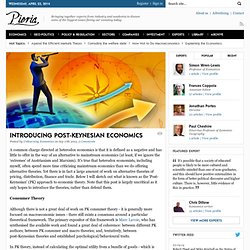
It's true that heterodox economists, including myself, often spend more time criticising mainstream economics than we do offering alternative theories. Yet there is in fact a large amount of work on alternative theories of pricing, distribution, finance and trade. Below I will sketch out what is known as the 'Post-Keynesian' (PK) approach to economic theory. Note that this post is largely uncritical as it only hopes to introduce the theories, rather than defend them.Consumer Theory Although there is not a great deal of work on PK consumer theory - it is generally more focused on macroeconomic issues - there still exists a consensus around a particular theoretical framework.
Former President of the Central Bank of Belgium on Why the Money System is a Taboo Topic. Paul Davidson: What Makes Economists So Sure of Themselves, Anyway? By Paul Davidson, America’s foremost post-Keynesian economist. Paul Davidson (economist) What is Modern Money Theory? By L.
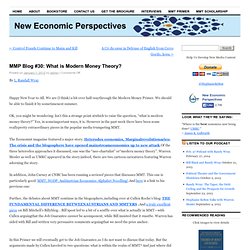
Randall Wray Happy New Year to All. We are (I think) a bit over half-waythrough the Modern Money Primer. We should be able to finish it by sometimenext summer. OK, you might be wondering: Isn’t this a strange point atwhich to raise the question, “what is modern money theory?” Further, the debates about MMT continue in the blogosphere,including over at Cullen Roche’s blog: THE FUNDAMENTAL DIFFERENCE BETWEENAUSTRIANS AND MMT’ERS .And a truly excellent piece on Bill Mitchell’s Billyblog: . In this Primer we will eventually get to the Job Guarantee,so I do not want to discuss that today. My 1998 book was entitled “Understanding Modern Money”. I tended to call our approach the State Money approach inthe early years; perhaps I also used the term Chartalist. Later, our approach was given the name“neo-Chartalist”—which I think was supposed to be somehow derogatory.
In any event, somehow it got the name Modern Money Theory. Main Page - MMTWiki. MMT in a nutshell.
International Post Keynesian Conference. Economic Roundtable: Post-Keynesian Theory. New Directions in Monetary Economics: An Interview with Marc Lavoie – Part I. Marc Lavoie is a professor in the Department of Economics at the University of Ottawa.
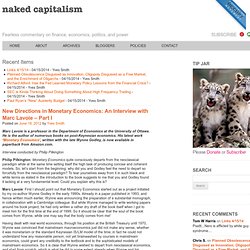
He is the author of numerous books on post-Keynesian economics. His latest work ‘Monetary Economics’, written with the late Wynne Godley, is now available in paperback from Amazon.com. Interview conducted by Philip Pilkington Philip Pilkington: Monetary Economics quite consciously departs from the neoclassical paradigm while at the same time setting itself the high task of producing concise and coherent models. So, let’s start from the beginning: why did you and Godley feel the need to depart so forcefully from the neoclassical paradigm? Marc Lavoie: First I should point out that Monetary Economics started out as a project initiated by my co-author Wynne Godley in the early 1990s. Our book Monetary Economics also tries to provide appropriate answers to these questions. ML: Well, that is a rather grandiose question! PP: That’s an impressively succinct answer to a very general question. PP: Interesting. Monetary Economics : Wynne Godley, Marc Lavoie.
Description This book challenges the mainstream paradigm, which is based on the inter-temporal optimisation of welfare by individual agents.
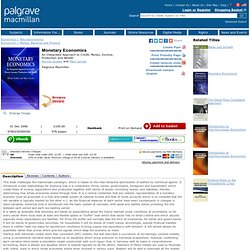
It introduces a new methodology for studying how it is institutions (firms, banks, governments, foreigners and households) which create flows of income, expenditure and production together with stocks of assets (including money) and liabilities, thereby determining how whole economies evolve through time. It is a central contention that any realistic representation of a monetary economy must be grounded in a fully articulated system of national income and flow of funds accounts which is so complete that the nth variable is logically implied by the other n-1. As the financial balances of each sector have exact counterparts in changes in stock variables, historical time is introduced into the basic system of concepts, with asset and liability stocks providing the link between each period and each succeeding period.
Reviews Contents Authors. Michal Kalecki. This book examines the life and work of the extraordinary Polish economist, Michal Kalecki.

It discusses Kalecki's theory of the capitalist economy, and provides a thorough guided tour through his published works, including his important writings on the economics of underdeveloped countries. Kalecki's ideas received wide international recognition during the period when Keynesianism predominated in the economic landscape. In the early 1930s, Kalecki anticipated many aspects of the principle of effective demand that later John Maynard Keynes put forward in his General Theory of Employment, Interest and Money. This book commemorates Kalecki's originality, and great contribution to economics.
Jan Kregel. Director of Monetary Policy and Financial Structure.
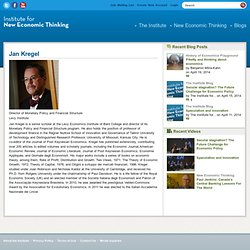
Jan Toporowski on Julio López on Kalecki. Post Keynesian economics. Introduction[edit]
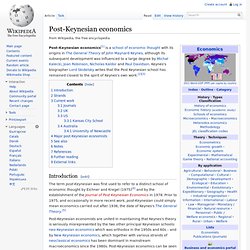
James K. Galbraith: The Final Death (and Next Life) of Maynard Keynes. "John Maynard Keynes" by Steve Hunnisett on flickr Posted below, with kind permission of the author, is the transcript (see note below) of James K.
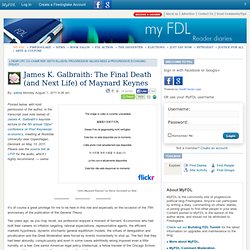
Galbraith’s keynote lecture to the 5th annual “Dijon” conference on Post Keynesian economics, meeting at Roskilde University near Copenhagen, Denmark on May 13, 2011. Please see the source link at UTIP for the audio, which I highly recommend. — selise. Bill Moyers and James K. Galbraith. The Final Death (and Next Life) of Maynard Keynes.